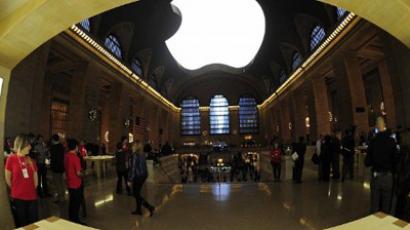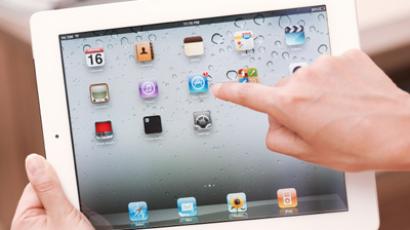Apple grows on iPad demand, but can the bubble burst?

The world is back into mile-long queues besieging Apple Stores as the 3rd generation iPad hits the market. Apple’s value soared to over $500 billion, but is it an apple-flavored bubble soon to burst.
Even before the new iPad became available, Apple’s worth hit an astonishing 559 billion dollars, making it the world’s most valuable company. It is now worth almost 90 billion dollars more than the oil giant ExxonMobil. In the first three months of 2012, Apple’s shares went up by more than 30 percent, and have grown a staggering 4500 per cent over the last decade. The most striking statistic, probably, is that Apple alone is worth more than three other high-tech giants – Microsoft, Intel and Cisco – combined. While masterminds at Apple’s base in Cupertino, California uncorked champagne to celebrate the company’s leap over the half-trillion mark – it is only the 6th time in history that any company has managed to achieve this feat – some media have already started comparing the technological giant with countries. “Apple is worth more than Poland” has been a popular headline in the technologies and finance sections of global newspapers. At first glance, the idea may be right – Poland’s current GDP stands at around 470 billion dollars. Apple’s net worth is 36 billion more and if it were a state, it could have been the world’s 20th biggest economy.Vladimir Rozhankovskiy, director of the analysis department at “Nord Capital” believes such comparison may not be the most accurate. "Certainly, everything has its price. And, say, one gram of caesium costs more than a Maserati sports car if we compare their worth. But in the case of GDP, it is a very relative number. It depends on whether it is judged on the products and services revenue itself or on the domestic market’s capitalization. And in the case of Poland – with its narrow market – it’s hard to say what actual GDP number will be there”. Moreover, a company’s worth is estimated from current and future sales. Which means Poland’s GDP would have to be multiplied by its potential growth rate – and that could be by 5 times – if it were to be compared with Apple. But all comparisons aside, Apple is still a huge company with probably the hottest shares on the market. But not so attractive for everyone, as some analysts believe Steve Job’s creation could within years become another financial bubble to burst. “Latest market research in Asia says its interest towards the proposed iPhone5 is waning. Competition – especially with Samsung and its Galaxy Note – is stronger than ever. But Apple now doesn’t have Steve Jobs – the genius who generated ideas for the people’s needs. Now it doesn’t have the man to take it forward and, I think, it will now only modernize its products, not innovate as before. That’s why I would not buy an Apple share now” – says Vladimir Rozhankovskiy.Moreover, Vladimir says, Apple belongs to the Nasdaq index – one of the three most volatile indexes across the Atlantic. It may be on the rise now, but software giant Microsoft provides a clear example of how things could go wrong. Back in 2000, it became the most valuable company of all-times, estimated at staggering 600 billion dollars. Now it stands at less than half of that – 266 billion. So a comparison between a country’s economy and a multi-billion corporation may seem inaccurate and out-of-place to some. But they do have one thing in common – just like a prosperous state can witness a sudden economic crisis, any company’s shares can free-fall at any time.














